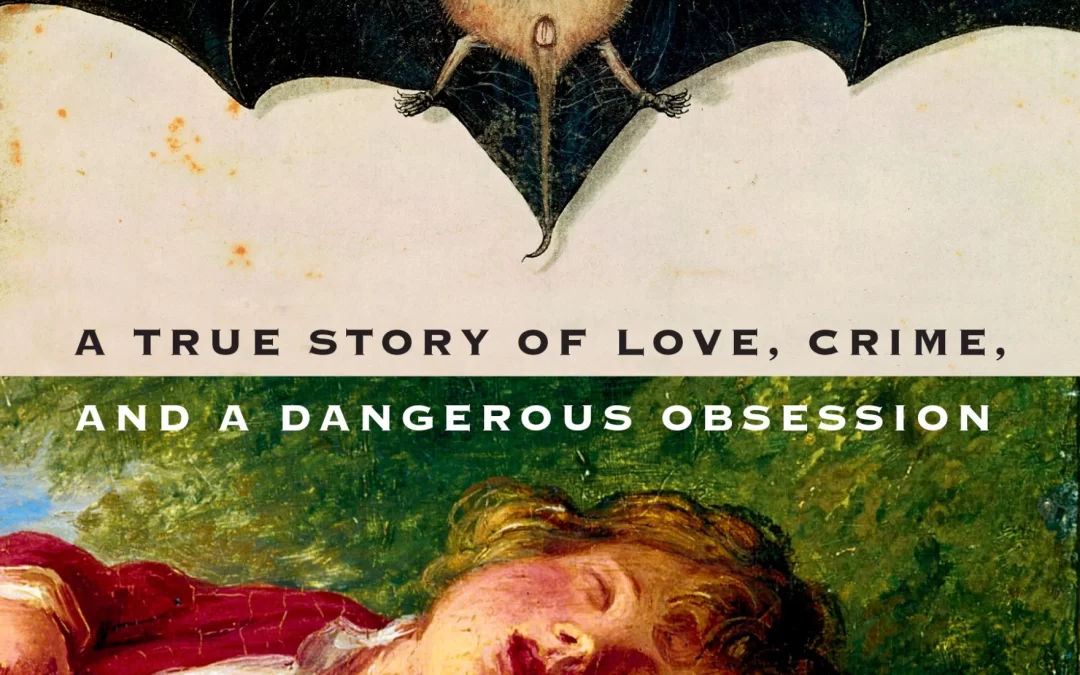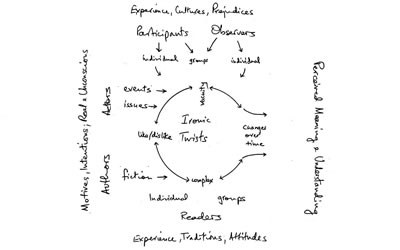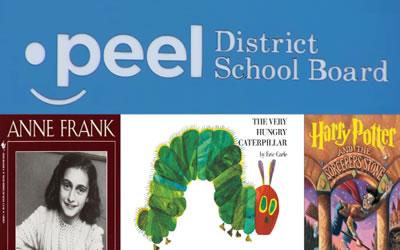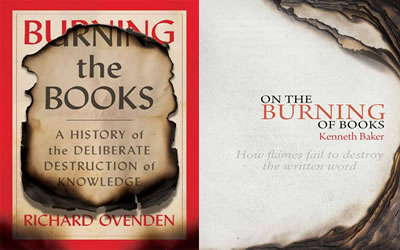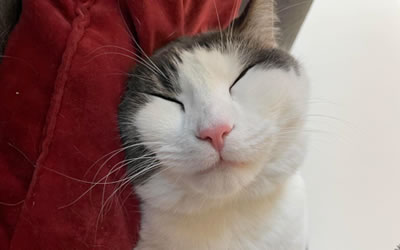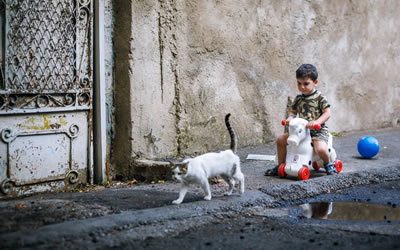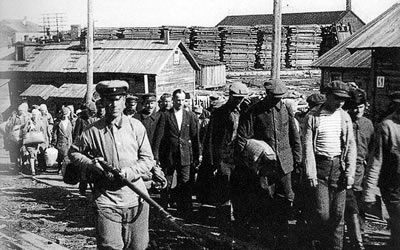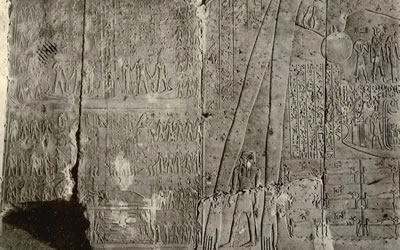(A Children’s Story for Grown-Ups)
Editor’s note: The Pendulum has already swung back to defend Enid Blyton’s Noddy books from charges of racism and of excessive insensitivity to such human afflictions as having large ears. See the Independent (https://www.independent.co.uk/news/the-truth-about-how-noddy-was-framed-1256823.html), and David Rudd’s ‘Enid Blyton and the Mystery of Children’s Literature’.
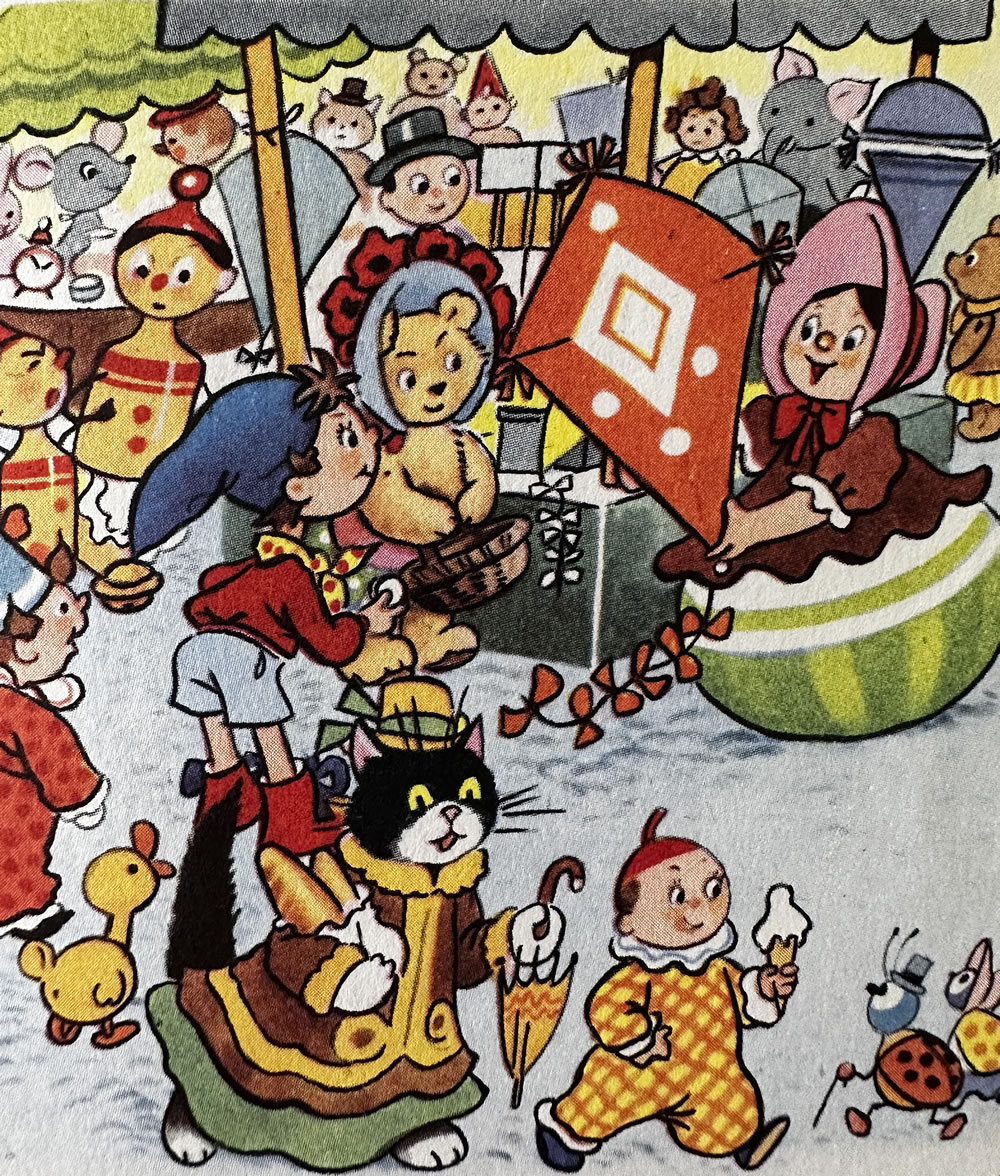
The legless Wobbly Woman, From ‘Noddy and Tessie Bear’, illustrator Robert Lee
Noddy was down in the dumps. Even his little car had sensed it, and stood, subdued and forlorn, in its garage next to House-for-One, its familiar ‘Parp-parp’ unnaturally silenced.
Tessie Bear, clearing away the breakfast egg she had brought and cooked for him, could not bear to see Noddy so disconsolate.
‘ Cheer up, Noddy!’ She tapped his wooden head to set it nodding, just as the milkman did. ‘It’s time to get back to work. Toytown needs its taxi driver.’
‘Oh, Tessie,’ Noddy wailed, ‘It’s not that easy. I am worried about Gilbert. Where is he?’
‘I know, Noddy. I am anxious, too. But you’ve looked for him everywhere, and no-one has seen him or his parents. The sad thing is no-one else seems to care the way we do.’ She sighed. Tessie was a kind little bear. She patted his shoulder to comfort him.
‘I’ve known him for ages,’ lamented Noddy. ‘We were at school together, and now he has disappeared. If the family had moved, he would have come to tell me.’ He nodded his head so sadly that the bell at the end of his hat did not even ring. The silence made Tessie uneasy. She took his hand in her soft, gentle paw.
‘He sat next to me in class. We were friends, even though we fought together at times. We sang songs at the concert. His father conducted the choir.’
‘Have you asked Mr. Plod?’ Noddy brightened. Tessie always had good ideas.
At the police station, P.C. Plod looked up from his desk. Behind him on the wall was a new poster of a man with dark eyes under a large police helmet. Beneath the eyes was the legend, ‘Big Brother Is Watching You.’
‘What’s all this, then?’
‘I wish to report a missing person,’ said Noddy.
‘Name?’
‘Noddy.’
‘No, not your name. The name of the missing person.’
‘Gilbert Golly.’
‘Now then, now then, Noddy.’ He got up from his desk, and leaned over it. ‘Well, golly gosh, Noddy. Golly gone.’ He laughed nastily at his own cleverness.
‘I don’t understand.’ Noddy looked perplexed. Tessie squeezed his hand to reassure him.
‘All golliwogs are gone. By order.’ Mr. Plod closed the big picture book he had been reading. It was full of pictures of gollies.
‘Gone? Where? Why?’
‘To a gollie gulag as far as I know or care. I don’t make the law. I just enforce it. Orders is orders. All gollies had to go. Off to Gollywog Gulag. As of last Friday. Black Friday. Black for them, but that’s app-ro-peri-ate, isn’t it?’ He sniggered.
‘All gollies? Mr. Golly the garage owner, too?’
‘Gone. Golly Garage is now Toy Garage, Mr. Sparks in charge.
‘Did he sell his garage?’
Mr. Plod looked exasperated. ‘No idea. Exper-pro-peri-ated, I expect.’
Tessie gave a cry. She turned and ran out of the police station. Noddy hesitated, and then asked, ‘And Mr. George Golly? What about him?’
‘If he’s a golly, he’s gone. All gollies have gone. As I said. Now, unless there was something else…?
Emerging into the sunlight, Noddy looked in vain for Tessie. He had never liked Mr. Plod, and now he had frightened the little bear away. He decided to go to see Big-Ears. He, surely, would know what to do next. As he drove towards the outskirts of Toytown, he passed the Garage. No Mr. Golly, but a strange man wearing a polka-dot tie and what looked like an upside-down flowerpot on his head was standing looking very proprietorial with his arms folded in front of him on the forecourt of the garage. So Mr. Plod was right!
Arriving at Big-Ears the brownie’s toadstool house in the forest, where many woodland folk lived, Noddy sounded his horn. ‘Parp-PARP!’ Noddy’s friend looked up from his gardening in some irritation at being so rudely disturbed.
‘Oh, Big-Ears, Big-Ears! Everything is wrong!’
‘Whatever is the matter, Noddy?’ Big-Ears’ kind face was suddenly anxious. ‘Are you in trouble?’
‘I’m not, but Gilbert Golly might be. He’s gone. So has Mr. Golly at the garage. All the gollies have gone!’
Big-Ears’ kind face fell. He looked troubled. He sighed and put down his spade.
‘I know, Noddy. It is a bad business.’
‘When did you know? Why didn’t I know? Where have they gone? Why has this happened?’
‘Steady on! One question at a time. I knew only yesterday for certain, and I have no idea where they have gone. You didn’t know because you’re a toy living in town, while I knew because I’m an elf living close to Nature. My ears are big enough to pick up much that passes in the wind, but even I do not know everything. Come inside, and let’s have some cocoa.’
They climbed the narrow staircase that led up the stalk of the brownie’s curious house to a circular room in the head of the toadstool. Big-Ears made some cocoa and took two ginger biscuits out of a tin. It was always reassuring to be with the brownie. His white beard and the curly grey hair under his tall red cap made him look wise. His house was cosy and comforting. Outside, the wind had begun to pick up, and shadows to lengthen, as the day began to close.
‘Now that you’ve got your breath back,’ said Big-Ears, ‘I can begin to give you some answers. But you must be brave. What I have to tell you is not pleasant.’
‘Oh, Big-Ears! You’re frightening me! Whatever can it be?’
‘The truth will set you free.’ Noddy was used to such gnomic utterances from his friend.
After all, he was a brownie, a sort of elf.
Big-Ears persisted. ‘Do you know what racism is?’
‘No. What is it?’
‘It is the belief that a group of people deserves to be mistreated because they look different.’
‘But everyone is different.’
‘Yes, but some differences cannot be changed. You can change from a thoughtless young scamp to a kinder, more considerate person, but you cannot change your skin colour. Somewhere someone who makes the rules for us–’
‘Like Big Brother?’
‘No. He’s another matter, but there is a connection, yes. Someone who makes the rules has decided golliwogs do not belong in Toyland, and has deported them. Or worse.’
‘But why? What have they done wrong?’
‘Nothing. But someone doesn’t like the look of them. A bigot, perhaps.’
‘Who are these bigots?’ Are they like goblins?
‘No, the problem is, racist bigots do great harm, but they look normal. It’s what Hannah Arendt called the banality of evil. They often sincerely believe that the evil they do is good. They lie to themselves. They don’t even live in Toyland, but they meddle with us nevertheless. They live Outside, where the wind comes from, the wind they are full of.’
‘Why don’t they like the look of golliwogs?’
‘They’re black.’
‘So? ‘ Noddy jumped up from the table so quickly that he spilled his cocoa. His sense of fair play was outraged. ‘I’m made of wood, and dolls are made of china. Claud the clown is clockwork. And you’re not even a toy! Mr. Wobbly Man has no legs! We have all live together, stuffed and wooden toys and fairies and animals, ebony and ivory, in harmony, in a great diverse multi-coloured, family. Even goblins–’ Noddy paused, remembering his own role in catching a gang of goblins who had stolen all of Mr. Golly’s cars one dark night not so long ago. ‘Why weren’t the thieving goblins de-parted?’
‘Deported.’
‘Deported, then. Why weren’t they, if the gollies were?’
‘They were punished. They each had to pay a penny fine, remember? The problem is that we do not know what happened to the gollies. That is probably deliberate. The bigots don’t want us to know. Gollies just disappear. In time, people will forget them.’
‘Well, I won’t,’ said Noddy. ‘How can we find out where they went?’
‘I have an idea,’ said Big-Ears. ‘But you must stay for supper. While I get it ready, read this chapter from this book. It’s about what happened to a horse called Boxer, who also disappeared. The book is about the lies told by those in power to those who know no better.’
‘Animal Farm, by George Orwell. Yes, I’ll read it, Big-Ears.’
At the same time, back in Toytown, P.C. Plod (‘That’s not for Police Constable, but for
Politically Correct’ he proudly told those few who asked) was humming to himself as he drew a big black ’X’ through the pictures of the gollies in his picture book. This was fun.
‘Put the book aside now,’ said Big-Ears. ‘We can talk about it later. Before I tell you my idea, I must warn you that we may be in grave danger.’
‘Danger? From what?’
‘I’m a brownie, Noddy. That’s half-way black.’
‘Oh, that’s nonsense, Big-Ears. Who would want…’ He stopped with a grim realization.
‘Exactly, Noddy. In such a world as ours, no-one is safe. First they come for the gollies, but no-one does anything because they aren’t gollies. Then they come for the teddy bears, but no-one says anything because they aren’t teddy bears. Then they come for the brownies or the wooden men. If no-one speaks out, there’ll soon be no-one left to cry foul. Pastor Niemoller said that.’
‘Who was he?’
‘I heard it on the wind. I also heard that in that same place, they didn’t like outsiders who were different, and so they forced them to wear yellow stars on their clothes, and they took their businesses and all their possessions from them. Later they were put into concentration camps, adults and children alike, and…’ He hesitated.
‘And what?’
‘They were never seen alive again, Noddy.’
Noddy shuddered. Silence fell in the room. The candles in the branched candelabra on the table had burned low, throwing menacing shadows on the walls. Outside, the wind moaned, laden with painful memory, and a branch outside began an ominous tapping against the toadstool house, as if to arouse the friends to action.
‘I’m scared, Big-Ears.’
‘I know you are. Let me tell you my plan. First we must visit Golliwog Town. They may have gone there voluntarily. Or they may have been sent there. If there are any gollies there, they may be able to tell us what happened in Toytown..’
’And Gilbert might be there!’
‘Hope springs eternal in the wooden breast.’
’But… if there are no gollies there, either?’
‘Then we must use Plan B…’
They set off in Noddy’s car early the next morning. Golliwog Town, like Skittle Town, Toy Cat Town, Wizard Town, and a host of similar communities, was a town named for those who constituted the majority of ethnic inhabitants in each. Gollies had freely chosen to live in Golliwog Town, but any family of stuffed or wooden toys, dolls or animals could make their home there if they wanted to. At least, Big-Ears had warned, that was the way it was before Black Friday. Was it still so? They drove over hill and dale, through the Dark, Dark Woods, past farm land and common land, crossed rivers and skirted marshland, but at a crossroads where the signpost to Golliwog Town used to stand, were puzzled to see that the sign indicated the direction to ‘Monkey Town.’ They drove on in silence, puzzled to discover that the highway compelled drivers to keep turning Left in order to get to Monkey Town. Big-Ears forbore to tell Noddy this could only mean that one would travel in a circle. One sign read, “Right turns are prohibited. They only take you backwards.”
The settlement they came to was disturbingly like the Golliwog Town they both knew, but there were no gollies in evidence anywhere, and there was a smell of rot and decomposition in the air. The gollies had all vanished without a trace. It was an eerie feeling for the two friends, driving down the main street looking in vain for a friendly golly face. There were all sorts and conditions of folk of every variety and species familiar to Toyland citizens, including a multiplicity of monkeys in the park, nearly all gesticulating furiously and jabbering incoherently. One was wearing a grey uniform inscribed with its wearer’s name: ‘Old Jeremy,’ looking lost and confused in a white beard, while another bearded ape on top of a tree was yelling profanities at the heavens, another haranguing a statue of himself, while yet another was floating down a river to the sycophantic applause of a battalion of admirers waving red books at him. A host of other monkeys swinging from the trees, shrieking maniacally to one another, some defecating on well-dressed gentlemen and their wives, others tormenting children and swiping bananas from unwary picnickers, but not a golliwog to be seen. “We’re the masters now!” they shrieked. “We all think so, so it must be true!” Ignoring the sound and fury that signified Nothing, Noddy stopped his little car at the kerb beside a tall china doll with golden hair and beautiful blue eyes.
‘Excuse me,’ he said politely, ’Do you know if Mr. George Golly lives here?’
‘Never heard of him,’ she answered disdainfully, before turning on her heel and going into a dress shop.
‘Why did you ask her about him?’ asked Big-Ears, as he watched the doll disappear.
‘He was a very nice fellow I gave a ride to who always wore a top hat. He stood out in a crowd. The fare was sixpence, but he gave me a shilling because I sang him a song. I always remember that. Memories of acts of generosity stay with you, don’t they?’
‘They should, yes.’
‘I remember Mr. Golly at the garage for the same reason. He gave me my first job in Toyland, washing cars for him. He took a chance on me.’
‘That was just after you arrived in Toyland.’
‘Yes, it was. At the start, no-one was sure if I was a toy or an ornament. If they’d said I was an ornament, I couldn’t have stayed. So I know,’ said Noddy reflectively, ‘what it’s like to be an outsider…’
‘Yes, I know what you mean,’ said Big-Ears, as he scanned both sides of the road they were driving along.
‘Big-Ears, what happened to Boxer? The book does not say. He worked so hard for the animals. What really happened to him?’
‘I’m afraid,’ replied his friend, ‘that he was made into glue. Look, there’s a police station. I’ll ask there. Wait in the car for me here. I’ll only be a minute.’
As he waited, Noddy felt a song coming on. He was famous for his songs, which pleased some, and annoyed others.
‘Good golly, Miss Molly,
You’re a very fine golly,
A jolly fine golly indeed!
To send you away is an act of such folly,
When we all have of you so much need!’
A small crowd of onlookers had assembled to hear Noddy sing in his loud voice, head nodding and bell jingling in time to the rhythm, as he stood upon the seat of his car. As he finished, there was applause from all except the monkeys. Encouraged, he began a new song just as Big-Ears re-appeared.
‘O where, tell me where, have the golliwogs gone?
They’re not there where they were, so I look far beyond,
By land or by water, by beach or by pond–’
‘That’s enough, Noddy. It’s time to go,’ said Big-Ears, cutting him off, and jumping into the seat beside him. ‘Let’s be off!’ Something in the brownie’s stern gaze made Noddy comply with his request without arguing. He started the car to the mutterings of some monkeys who had been listening. A policeman with truncheon drawn and a dark scowl on his face was approaching, led by yet another monkey. Noddy drove off quickly. ‘Parp-PARP!’ went his little car, as pedestrians scurried to safety.
‘The natives aren’t friendly,’ observed Big-Ears. ‘Time for Plan B.’
‘But they’re not natives. This is the gollies’ town!’
‘I was being ironic.’
‘What’s “iconic“?’
‘Well, not golliwogs, apparently. They’ll be removed from marmalade jars next…’
‘Big-Ears! Sometimes I just don’t understand you at all!’
‘Plan B, Noddy. We need to find the road to Wizard Town…’
From a distance, tall towers rising up into the clouds gave Wizard Town a different appearance from any of the other towns the friends had driven through. The streets curved this way and that, and there were black cats for sale in many shop windows.
‘I don’t much like wizards,’ said Noddy. ‘The Wily Wizard wanted my car once, and turned your cat Whiskers’ nose into an elephant’s trunk!’
‘Don’t worry, Noddy. Wizards know more than they let on, but my spells are a match for those of any wizard. Turn up this road.’
They had arrived at a castle with a moat. The drawbridge was down, but so was the portcullis behind it, barring the way. The castle had a defeated, abandoned look about it. Noddy drove on to the drawbridge and sounded the horn. ‘Parp-PARP-PARP!’ Two suspicious goblins looked out of a turret window. Noddy’s little car gave a growl of displeasure as the Wily Wizard, in a long cloak marked with stars, appeared behind the portcullis. It evidently remembered the wizard’s attempt to abduct it in the past.
‘Wily! Open up! It’s Big-Ears and Noddy.’
‘Have you come to give me the car? Have you? O precious, precious car! How lovely to see you! Well, Noddy, have you finally come to your senses?’ The wizard rubbed his hands with glee, and performed a little victory jig. His greedy little eyes bulged with desire. ‘Is it to be mine? Truly, truly mine? How much do you want for it? Don’t think you can trick me out of it this time!’
‘Noddy’s car is not a gift, nor is it for sale, but he will give you a ride in it in return for a tour of the castle.’
‘Done!’ said Wily excitedly, turning the windlass to raise the portcullis. ‘What do you want to look around this old place for? There’s nothing here but musty old books that no-one reads, and broken-down machinery that no-one can use. The roof leaks, and it’s damp and cold. It used to be called a ‘heritage’ building. No one cares about the past nowadays.’
‘Noddy has never seen it before,’ said Big-Ears simply. It was enough to convince the wizard, who began excitedly to examine the car he had coveted for so long, while Big-Ears beckoned discreetly to the curious goblins behind him.
’May I drive it, Noddy? May I? Please?’
’No,’ said Noddy. But you may sit beside me.’
Chattering to himself, Wily poked and pried into every recess of the car, which permitted this violation of its person with admirable restraint. He caressed its flanks, admired his reflection in the mirrors, patted the upholstery, peered uncomprehendingly into the engine and owner’s manual, and sounded the horn repeatedly. Big-Ears, unseen, surreptitiously slipped the goblins sixpence each.
The wild ride through Wizard Town was mercifully soon over. Wily had shown off shamelessly by howling, whistling, and calling out to every wizard he knew as they passed. When they returned to the castle, Noddy carefully pocketed the car key, and, at Big-Ears’ murmured suggestion, gave the Wily Wizard, to his great delight, some polish and a chamois cloth, before following his friend, up a circular stone staircase to a door high up in a tower. The goblins who had accompanied them stood at the door with their hands out. Big-Ears dispensed another bribe, and they were inside, in a bare room open to the sky, with a giant oval mirror set at an angle in a slab of granite, and dominating the open space in the centre.
‘There’s deep magic here, Noddy,’ said Big-Ears. ‘So deep the wizards themselves have forgotten it.’
Noddy held his breath as the brownie waved his arms across the face of the mirror and muttered a spell in a language Noddy had never heard before. Instantly, the cloudy surface of the mirror began to clear, and with a cry of recognition, Noddy saw himself and Big-Ears in the familiar photograph of them taken by the artist Beek shortly after Noddy had settled in Toyland. It showed them standing in front of a shallow lake, Big-Ears with his bicycle, Noddy waving at the camera. In the near distance, Mr .and Mrs. Tubby Bear, Tessie’s parents, were picnicking on the grass behind the friends. In the farther distance, forming a backdrop for the portrait, were the buildings of Toytown, nestled between the gentle undulations of the hills that framed the picture. From a tunnel in one of the hills, a train was emerging on to a viaduct that brought the railway track down to Toytown Station.
‘Look, Big-Ears! There’s Gilbert with his dog!’ Sure enough, in the foreground, but off-centre, as if caught unwittingly by the camera, a golly with a bow tie was talking to a brown-and-white dog, while some dolls held hands in a circle behind him. Of course, thought Noddy, Gilbert was in that picture; he himself had been there on that memorable day. Then, to the friends’ dismay, the picture began to quiver and slowly dissolve. There was a bright flash, and then it re-appeared. A casual glance would have concluded that it was the same picture as before, but Noddy noticed at once that it was not. In place of Gilbert, but standing where he had stood next to the dog, was the man with the bow-tie and flowerpot hat previously identified as Mr. Sparks, the new proprietor of Golly Garage. The other details in the picture– dolls, bears, the friends themselves– were as before.
‘Big-Ears! Gilbert’s not there! What has happened?’
‘Someone has edited the picture. Stalin did that all the time. Disgraced comrades simply disappeared from the photograph, as if they had never existed.’
‘Who’s Stalin? Was he a– bigot?
‘An evil leftist man from Outside who murdered millions of those he considered his enemies. They simply disappeared. Yes, you could call him a bigot, but a paranoid one, too. He said, “Man is the problem. No man, no problem.” Gilbert has been “unpersoned“, as Orwell would have said. Today, they would call it “photoshopped.” ‘
‘How do you know all of this?’
‘I told you. I listen to the wind. I keep my ears to the ground. This,’ he pointed to the mirror, ‘is proof of a sly attempt at revisionist history. It almost certainly proves that the gollies’ disappearance was no accident. Someone, I suspect, hated golliwogs enough to eliminate them. I’m going to try to confirm this.’
He waved his arms once again, and muttered some words. The picture disappeared. A sepulchral voice could be heard intoning
‘First you see them, then you don’t.
Now you miss them, soon you won’t.
Ethnic cleansing is the name,
So-called loss is really gain;
Out of sight is out of mind,
Soon the sighted all turn blind!’
All at once, a blurred and fleeting picture of golliwogs pushing handcarts piled high with possessions, with children clinging to their fathers’ hands or in their mothers’ arms, the odd one looking back in terror, all rushing away from some unnamed dread, flickered briefly across the surface of the mirror, as a voice pronounced
‘Imagine that you see the wretched strangers,
Their babies at their backs, with their poor luggage
Plodding to the ports and coasts for transportation,
For other ruffians as their fancies wrought
With selfsame hand, self reasons and self right
Would shark on you, and men like ravenous fishes
Would feed on one another.’
The picture disappeared. The voice stopped. Outside, shouting could be heard.
‘Probably Shakespeare,’ said Big-Ears. ‘What a prophecy!’
A goblin suddenly appeared at the door. ‘Trouble coming! This way, quick.’
But before the friends could move, a familiar voice rang out. ‘Now then, now then. Hold it there, you two!’ It was Mr. Plod, with the Wily Wizard in tow.
‘Take my advice, Noddy,’ said Mr. Plod, from behind his desk. ‘Keep your nose clean. Keep out of affairs that don’t concern you. I’m letting you off with a warning, as you weren’t trespassing. The goblins said you had the wizard’s permission to tour the old place, and all he was after was your car. I wasn’t about to let him have that. Besides, we need our taxi-driver back.’ He smiled patronizingly.
‘What have you done with Big-Ears?’
‘He’s cooling his heels for a spell–that’s a good one, a spell– for attempting to bribe two goblins. Naturally, as good citizens, they refused to take it. He tried to bribe them twice, too! The nerve! We have rewarded them with scholarships to Numskull University. But he’ll be out by tomorrow. Now, let’s have no more of this nonsense of bemoaning the past. What’s done is done. The future is before us. We move onward and upward. That’s what progress is. What’s done cannot be undone.’
Noddy drove home. Alone in his House-for-One, he put his head in his hands and wept tears of incomprehension and despair. ‘I am only a toy,’ he sobbed. ‘I can’t understand.’
He did not hear the gentle tap at the door, nor the pattering of little feet as Tessie Bear, an anxious frown on her face, came up to comfort him, putting her arms around his shoulders, wordlessly comforting him before going into the kitchen to put on the kettle.
Men deal with life as children with their play
Who first misuse, then cast their toys away.
– William Cowper, ‘Hope’
[Author’s Note: Enid Blyton’s Noddy books, originally published by Sampson Low in the 1950s were reissued in a ‘New Edition’ by BBC Books some 40 years later. In this new edition, all golliwogs were removed from the text and illustrations, out of concern that golliwogs might be demeaning to people of African origin, by ‘cancel culture’ ideologues addicted to sanctimonious censorship. David Rudd, former director of the U.K.’s National Centre for Research in Children’s Literature debunks blatant critical misreadings of Blyton’s alleged ‘racism’ in her depiction of golliwogs. These are, Mr. Rudd says, “predominantly good; there are, in fact, more ‘bad’ teddy bears than gollies.” Noddy’s favourable attitude to gollies in this story is consistent with his view of them in Blyton’s Noddy books.]
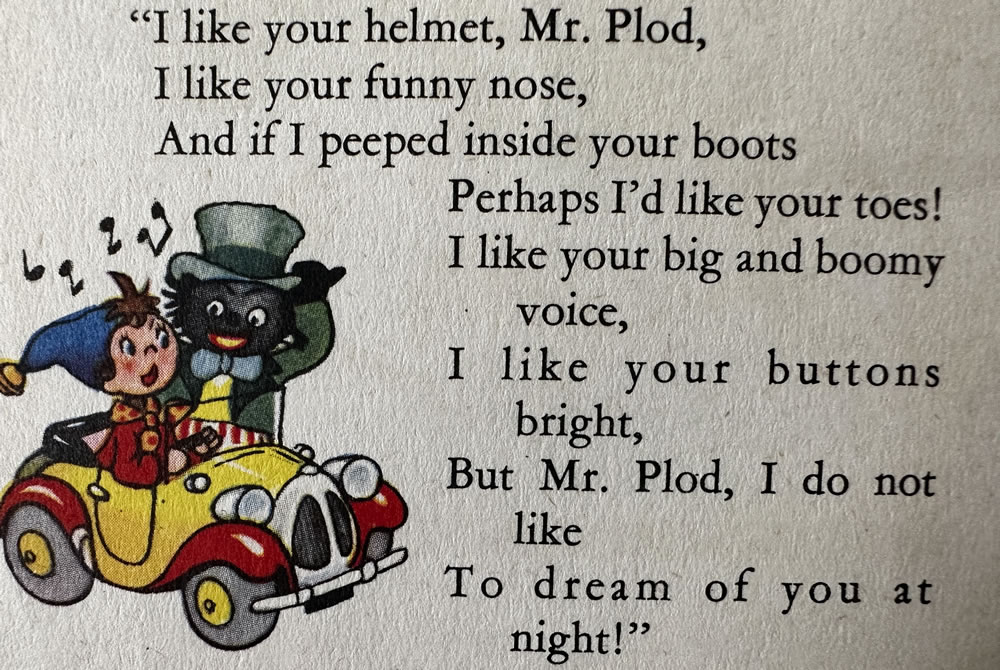
Poem of Noddy about Mr. Plod, illustrators Robert Lee and Robert Tyndall
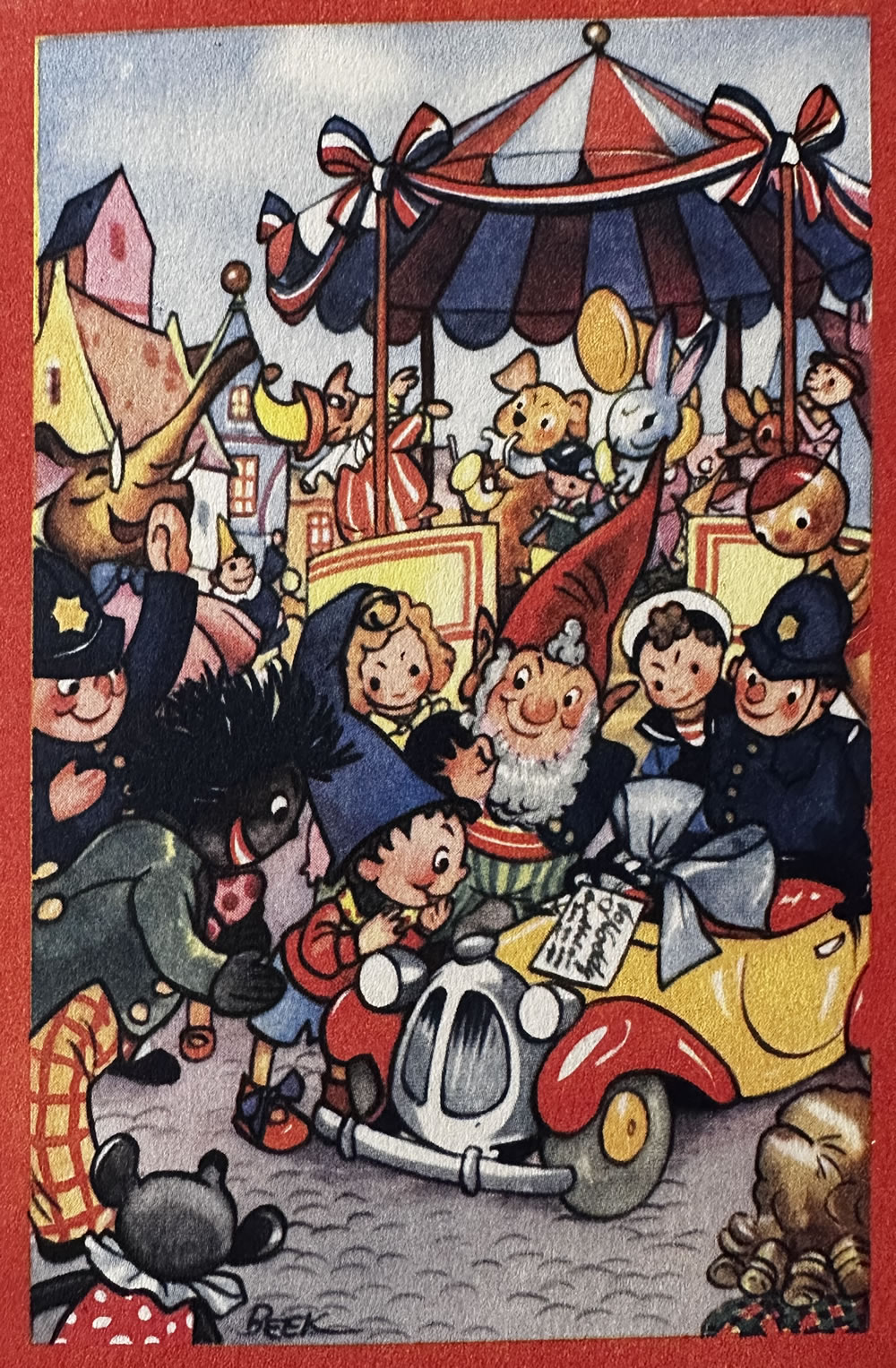
Mr. Golly rewarding Noddy, from ‘Hurrah for Little Noddy’, illustrator Harmsen Van der Beek
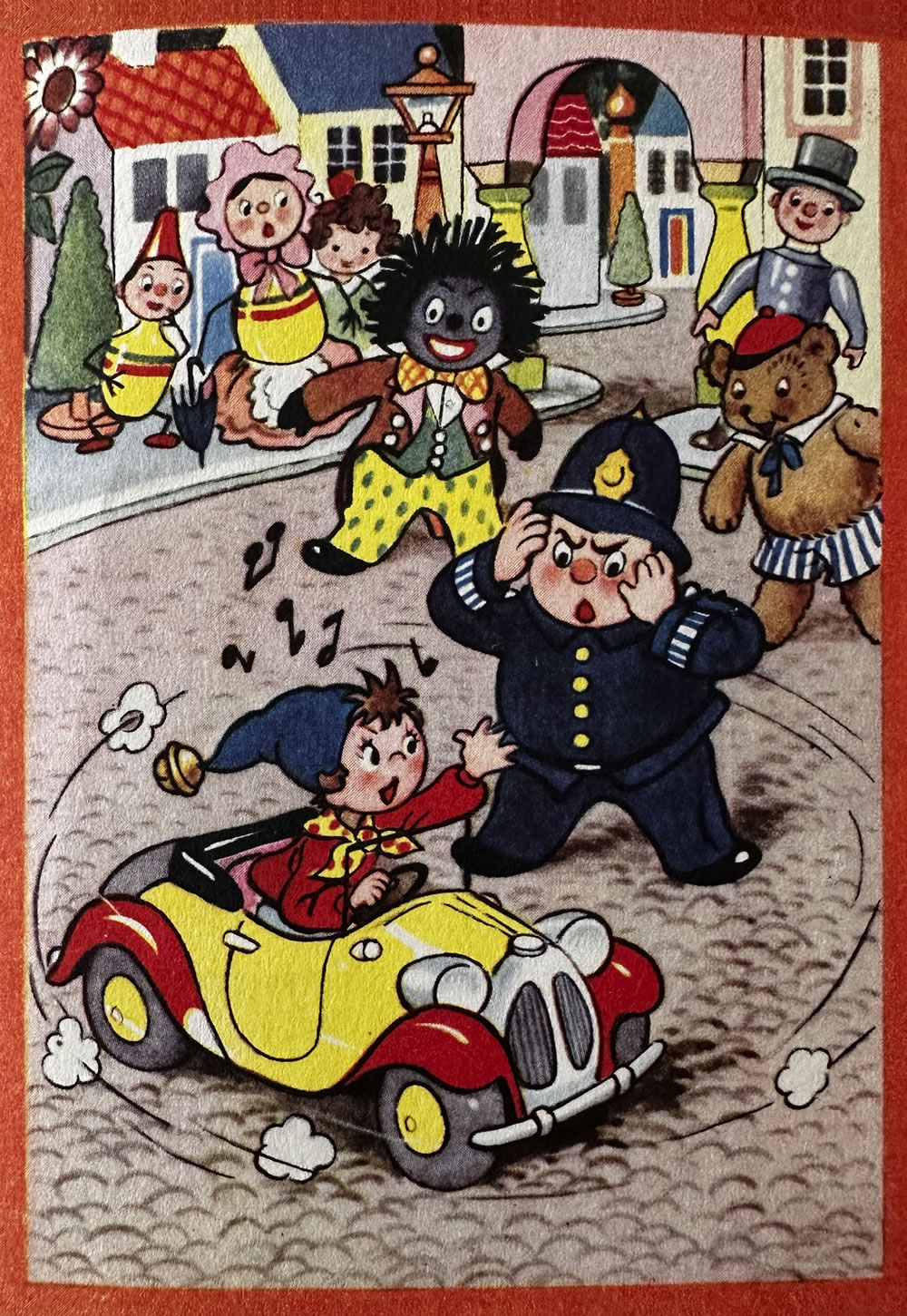
Noddy in his car driving around Mr. Plod, illustrators Robert Lee and Robert Tyndall
